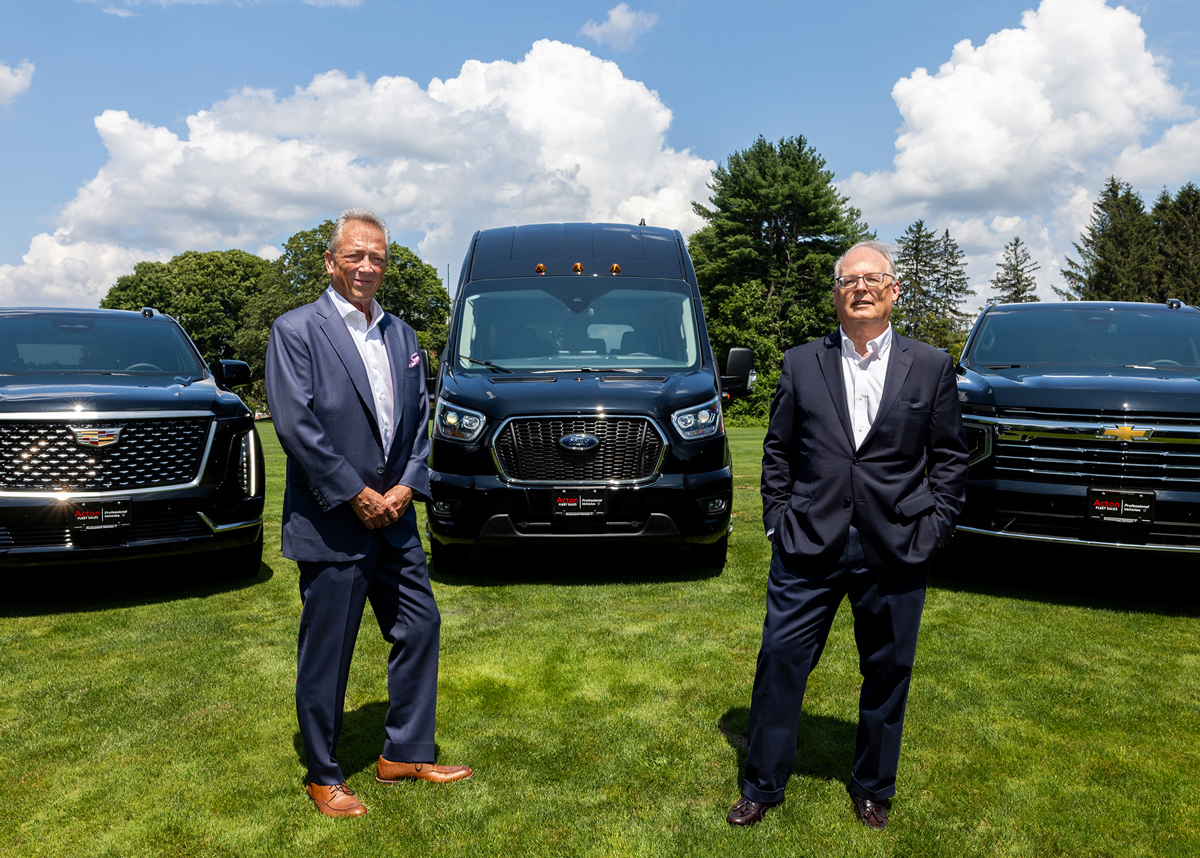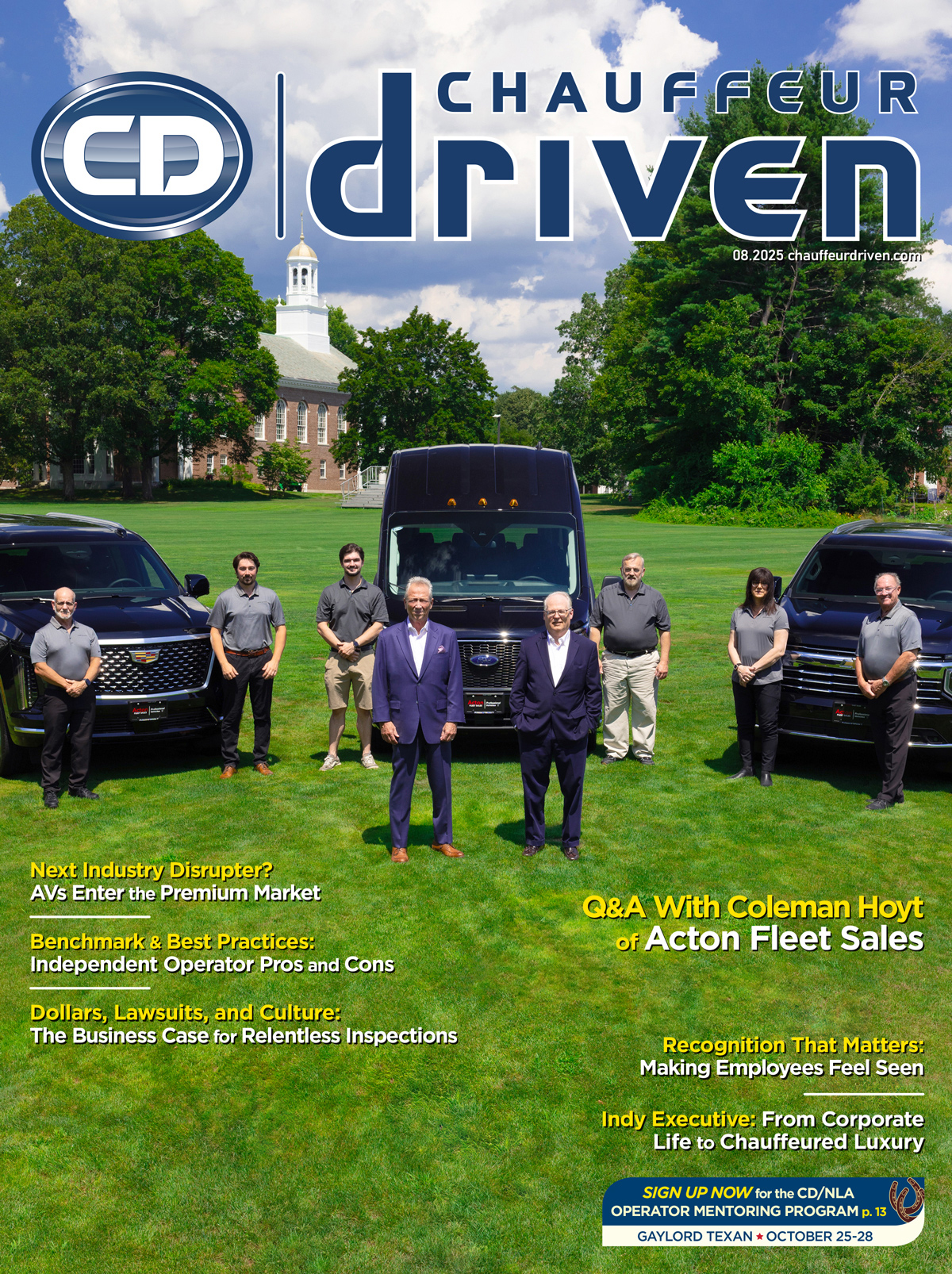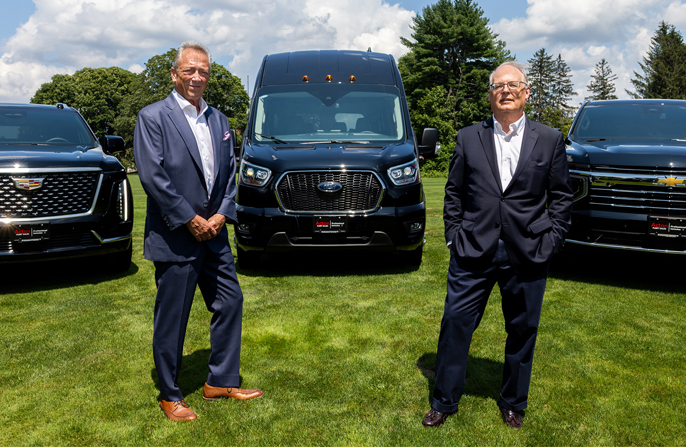 President/General Manager Bill Cunningham (left) and CEO Coleman Hoyt of Acton Fleet Sales
President/General Manager Bill Cunningham (left) and CEO Coleman Hoyt of Acton Fleet Sales
Acton Fleet Sales has been a household name for many in the industry, going on four decades. CEO Coleman Hoyt and President/General Manager Bill Cunningham, along with the rest of the Acton team, have built relationships with operators and OEMs that have endured for generations, not to mention the different vehicles that have come and gone over the years.
Until recently, the company was a one-stop shop known as Acton SoCal Penske, which established it as a multi-brand, nationwide operation. A few months ago, the partnership dissolved following the death of dealer principal Phil Hartz, with whom Hoyt was a close friend. We sat down with Hoyt for his take on the current state of the automotive industry and what is next for Acton Fleet Sales.
Chauffeur Driven: Before we address the separation, can you give a little backstory about the company?
Coleman Hoyt: Sure. Acton Fleet Sales pre-dated our arrangement with SoCal Penske by decades. Bill [Cunningham] and I have been doing this since 1990—35 years. We grew out of a small market Lincoln Mercury store in suburban Boston. With Bill’s unusual creative vision, we began experimenting in the commercial Lincoln segment, and we eventually became the second largest volume Lincoln dealer in the world. But our cars were kind of ‘invisible’ because they were fleet chassis units being drop shipped to coachbuilders all over the country. Limousine chassis supply naturally led us to livery vehicles and we were able to grow exponentially.
CD: Where does SoCal Penske fit?
CH: I had an old friend named Phil Hartz whom I had worked with in the ’70s and ’80s. We reconnected at a Ford meeting in Dearborn in the late ’90s. At the time, he was a 50% owner of the SoCal Penske Auto Group, with a wide portfolio of franchises in Los Angeles. He envied what we were doing at Acton with Ford and Lincoln fleet vehicles and wanted to be involved with us. When Lincoln began consolidating their stores in 2010 and 2011, including Acton Lincoln Mercury, Bill thought we should give General Motors products a try to diversify our offerings. Immediately Phil in California was like, “I’m in.”
Phil got it. By agreeing to let him join our fleet sales platform, we were able to have a presence on both coasts while learning a lot about GM’s products. We collaborated with him extensively and expanded our portfolio beyond the Ford and Lincoln lines. We did a lot of really fun stuff together with Cadillac XTS conversions, the Chrysler 300-L, and more.
CD: So, now you’re back to the Acton Fleet Sales name. What led to the separation?
CH: Phil passed away in 2021. As you might imagine, the type of business that we’re doing requires a fair amount of trust, because each of us had the other’s cars on the opposite coast. It just wasn’t the same without Phil. We had a different philosophy with the folks who continued the West Coast part of our business. We had had a great business relationship, but now we’re back to who we were before, and keeping our focus on our clients.
We have developed solid relationships with GM management, and we are continuing to represent those products on our platform along with the Ford and Lincoln vehicles. We have other dealer partners that are coming onto the Acton Fleet Sales platform to assist us, and we remain kind of the ‘supermarket of livery cars.’ We are a licensed dealer, and we’re acting as a trusted intermediary for our dealers of record.
 Cover Art: Acton Fleet Sales team (L to R): Fleet Sales Manager Bob Moody, Fleet Specialist Henry Heinlein, Fleet Inventory Manager Alex Schelfhaudt, President/GM Bill Cunningham, CEO Coleman Hoyt, VP/Controller Brian Wall, Fleet Sales/BDC Manager Eva Kraus, and Business Manager Mark Schelfhaudt. Photography by Sam Emam of Special 1 Media. CD: What changes can customers expect?
Cover Art: Acton Fleet Sales team (L to R): Fleet Sales Manager Bob Moody, Fleet Specialist Henry Heinlein, Fleet Inventory Manager Alex Schelfhaudt, President/GM Bill Cunningham, CEO Coleman Hoyt, VP/Controller Brian Wall, Fleet Sales/BDC Manager Eva Kraus, and Business Manager Mark Schelfhaudt. Photography by Sam Emam of Special 1 Media. CD: What changes can customers expect?
CH: Essentially none. We still have nine full-time employees, five of whom have more than 30 years of experience, so it’s the same people doing the same thing. We’re still coast to coast. We’re still selling livery vehicles all over the country. Our philosophy remains unchanged.
CD: How has your relationship with Bill stayed strong over decades?
CH: It was just a stroke of fortune that I bought a Lincoln Mercury dealership where he was a salesperson.
I recognized that he was really good with customers, was focused, and worked really hard. He was also obviously very creative ... and he cleverly talked me into taking the risk with this crazy commercial Lincoln stuff. He’s just a brilliant businessman. Ultimately, he developed something that was supremely successful, and I was lucky that it kept working. Maybe it’s a ying-yang thing. I am more cautious while he’s optimistic ... and very sincere about making sure that people are satisfied doing business with us. Perhaps most critically, he’s relentless when it comes to doing the right thing for our customers, even if it means it’s going to cost us money.
If we’ve done something wrong, we immediately address it. He just instinctively gets it that our reputation, how we’re perceived in the marketplace, is so much more important than any one car deal.
CD: What are your most popular vehicles right now?
CH: The Cadillac ESV and the Chevy Suburban are clearly the go-to solutions for most operators at the moment. I don’t foresee that changing, especially since Suburban buyers are so extraordinarily loyal. It’s just an absolute workhorse. I also think that with the Cadillac XT6 now discontinued, there’s also nice room for Lincoln Aviator as an excellent alternative to full size.
CD: Can you tell us about your partnership with Kellerman Specialty Vehicles?
CH: It dates back to the 1990s when Acton Fleet Sales (Acton Lincoln Mercury) supplied the limousine builders across the country with chassis. We still have relationships with the coachbuilders that remain, including Kellerman, which is primarily a hearse-building company. They’re very talented people and they have been studying the livery segment to develop some creative products. They’re really good, smart folks, and of course, we’re happy to help them.
CD: The Wagoneer was one of the most recent products you added. How is that going?
CH: We remain excited about the potential for the Wagoneer L because it’s absolutely serviceable from a product engineering and design package point of view. But Stellantis (Jeep) as an OEM does not have a robust management footprint at present to engage in this category of the fleet business. Limousine and livery is a small but very important segment because of the high visibility these products have and the associated value that can deliver to an OEM. Stellantis is trying to determine what to do with warranty coverage and dealer support. The product is fine, but my view is that they’re not ready to support this segment fully. We have stocked them and sold them, and we will do so again when Stellantis regains its footing.
CD: What about Volvo?
CH: The Volvo S90 sedan has been great, one of the few remaining sedans that worked for this segment. But the car is manufactured in China, so it’s vulnerable to all this crazy tariff mishmash. Volvo has determined that it’s not financially prudent to ship the S90 to the US, given that their retail customers largely favor smaller SUVs.
CD: Are any of your other products impacted by tariffs?
CH: Realistically, they’re all going to be impacted. For example, there’s a livery-approved package for the Lincoln Nautilus that’s built in China. It has a very strong retail performance in the US, so unlike the S90, it will continue to be sold here. So, it will face tariffs, but Ford will likely spread that impact across other vehicles that aren’t as badly “tariff impacted.” Similarly, GM will likely raise prices unilaterally because so many of their cars (or content) come from either Mexico or Canada. I fear we’re going to see significant price hits throughout the 2026 model year quite widely.
CD: There’s a lot of movement happening in the automotive industry. Where are we 10 years from now?
CH: Electrification is coming very aggressively. It can’t be stopped. Despite the current political turbulence over EVs, these vehicles could prove to be a superior form of engineering. Once people get over the implications of range anxiety and recharging, those vehicles could stay in cycle for 500,000 to a million miles because they don’t have all the internal combustion stuff that can’t deliver that longevity. We’ve sold Cadillac LYRIQs to livery operators, and the all-electric Escalade IQ is coming. More will follow.
Ten years ago, the industry was absolutely panicked over Uber and Lyft, understandably so. It turned out there was enough market opportunity for everyone. But now the technology network companies (TNCs) are migrating their business plan toward Waymo-like vehicles that don’t have drivers, so it’s a whole unknown chapter. Despite the current administration’s wish, or the anxieties of people who rely on our traditional chauffeured livery model to make a living, the technology is ultimately coming and we’re going to see the impact of it. I’m not happy about it, but we will all have to adapt.
CD: That’s a lot to think about. For now, what’s the most important thing you want the industry to know?
CH: Acton has been doing this a long time. We aren’t going away and we’re still selling vehicles all across the country. We can accommodate large or small orders. Most importantly, it’s the exact same cast of characters that’s reliably been on the other end of the telephone, literally for 35 years. [CD0825]




